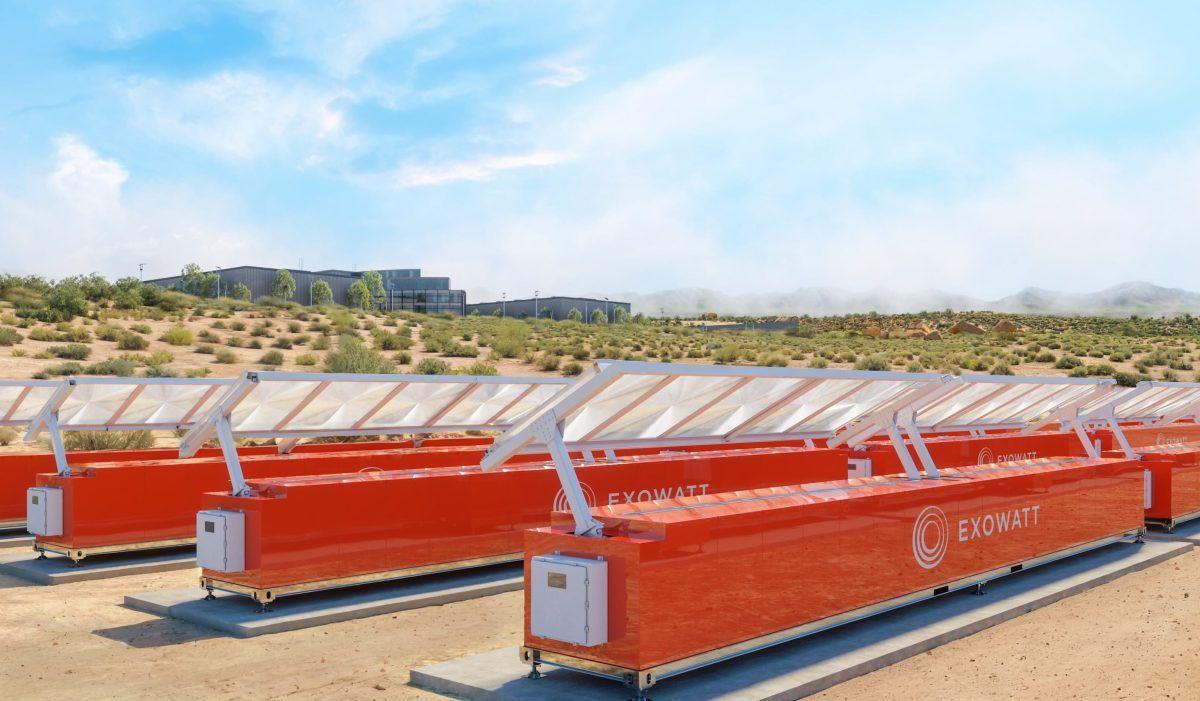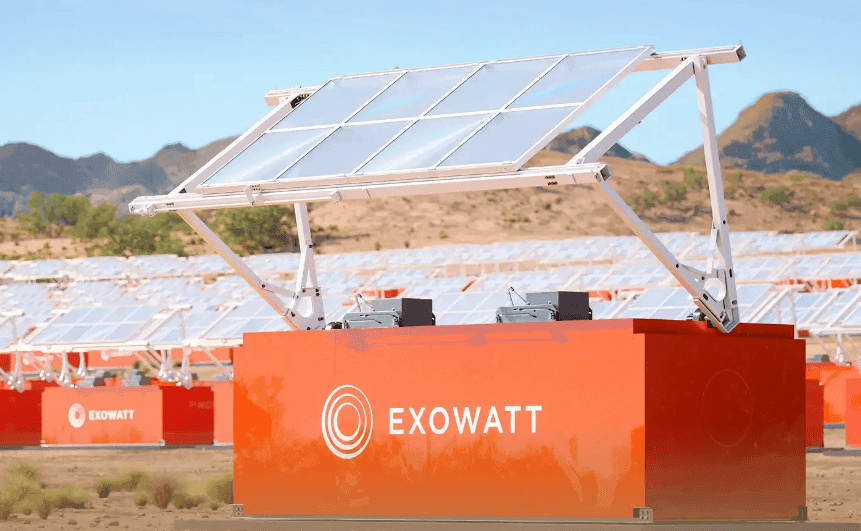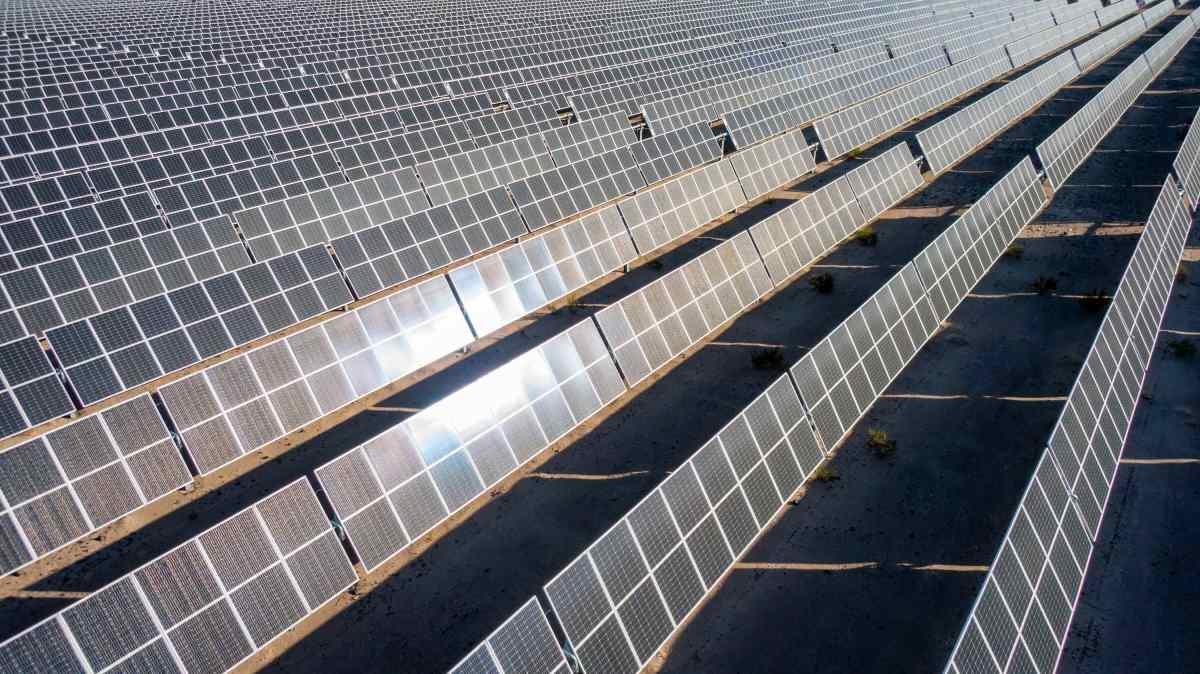Exowatt Raises $50M to Power AI Data Centers with Solar-Heated Rock Technology
2 Sources
2 Sources
[1]
Exclusive: Sam Atlman-backed Exowatt wants to power AI data centers with billions of hot rocks
When Hannan Happi started thinking about how to solve the AI power crisis, he kept one figure in mind: one cent per kilowatt-hour. "We went through all sorts of configurations and designs," Happi, co-founder and CEO of Exowatt, told TechCrunch. "They all look different from each other. We tried to learn from everyone one of them: How do I reduce structural costs? How do I reduce maintenance costs? How do I optimize for this?" After years of brainstorming and building, Exowatt's first step toward that goal is a simple box the size of a shipping container topped with a clear awning. Inside is similarly simple. If Exowatt can deliver on its promise of delivering cheap solar power that generates electricity 24-7, it could upend the data center market and broader energy world, delivering round-the-clock power at very low cost. To scale production in pursuit of the one-cent per kWh target, Exowatt has raised an additional $50 million in an extension to its $70 million Series A round that closed in April, TechCrunch has exclusively learned. The extension was led by MVP Ventures and 8090 Industries with participation from Atomic, BAM, Bay Bridge Ventures, DeepWork Capital, Dragon Global, the Florida Opportunity Fund, Massive VC, New Atlas Capital, Overmatch, Protagonist, and StepStone. Previous investors include Andreessen Horowitz and Sam Altman. Happi said that Exowatt wasn't looking to raise additional capital after the April round, but "strong momentum we saw in the market" and "strong investor interest" encouraged him to take the new money at a higher valuation. Exowatt's backlog is currently about 10 million P3 units representing 90 gigawatt-hours of capacity, he said. "The goal is to scale as fast as possible to the millions and ultimately billions of units," he said. The company should hit its one-cent target when production hits around 1 million units per year, Happi said. Exowatt is basically repackaging a technology that's been around for decades. Known as concentrated solar power or thermal solar power, it uses the Sun's energy to heat materials that are good at storing or transporting thermal energy. In cases where that thermal energy is stored for an extended period of time, those materials tend to be derived from or resemble rocks -- hence the technology's nickname of "rocks in a box." Each P3 device consists of a metal box topped with lenses that focus the sunlight into a tight beam. That beam then heats a special brick inside the shipping container. A fan blows air over the brick to carry the heat to another box which contains a Stirling engine (a piston-driven device that converts heat to mechanical energy) and a generator. To store more power, developers would install more P3 boxes. "Everything is designed to be extremely simple," Happi said. Each thermal battery can retain heat for up to five days, ensuring continuous operation, and Exowatt will string several together to feed a single generator unit. How many depends on how quickly and how much electricity a customer wants to generate. The system's efficiency is on par with photovoltaic solar panels, and slightly better than PV paired with lithium-ion batteries, Happi said. Other companies have built various approaches to the same technology, though most have failed to compete with photovoltaic solar and lithium-ion batteries, both of which have surprised experts with how quickly they've come down in cost. Happi argued that the P3's small size and Exowatt's iterative approach sets it apart. There are just over 100 solar thermal or concentrated solar power projects that are planned, built, or decommissioned around the world, he said. "If you compare that to the fact that we produce 1.5 billion solar panels per year, you can see the learning curve effects are very, very far apart from each other. "What Exowatt is about is taking a modular system that we know in principle works, and really scaling the manufacturing of that and then applying the learning curves of manufacturing." Exowatt is unlikely to be cost effective everywhere, and the number of P3 units needed to power a data center could require massive amounts of land. Plus, it works best in the sunniest regions, which could limit its broader impact. But Happi counters that there's a "high overlap" between where Exowatt's P3 excels and where new data centers are being built. "We're not running short of any projects to do," he said.
[2]
Exowatt has a rock-solid plan to provide cheap, abundant energy for AI data centers - SiliconANGLE
Exowatt has a rock-solid plan to provide cheap, abundant energy for AI data centers Exowatt Inc., a solar-thermal energy startup backed by OpenAI Group PBC Chief Executive Sam Altman and other high profile investors, wants to solve the artificial intelligence energy crisis with millions of hot rocks. To do that, it has raised millions of dollars - $50 million in fact, with today's round led by MVP Ventures and 8090 Industries. The round also saw participation from other investors including Atomic, Bridge Bay Ventures, The Florida Opportunity Fund, DeepWork Capital, Dragon Global and Massive VC. The round is described as an extension of the company's original $70 million Series A, which closed in April. Altman's involvement stems from its original seed funding round in 2024, where he was one of several angel investors. Exowatt says its thermal battery technology, powered by solar energy, has the potential to provide enormous AI data centers with electricity at rates as low as one cent per kilowatt-hour, which would make it around 90% cheaper than the average U.S. grid rate. If it can do this, it's sure to be of enormous interest to AI data center operators such as Microsoft Corp., Amazon Web Services Inc., Google LLC and Oracle Corp., which are all desperate for energy as they scramble to build out their infrastructure. With data centers springing up across the country, operators are desperate to secure a power source for them, but grid queues in some locations can stretch for years. As a result, data centers are being built faster than power suppliers can keep up. Exowatt is pitching a somewhat unconventional solution to this looming crisis, with millions of superheated rocks held in storage that can provide energy around the clock. The company's solar-thermal energy works by using concentrated solar power to heat up special ceramic or rock-based materials to temperatures as high as 1,200°C when the sun is shining. These materials act as thermal batteries, releasing the stored heat to power steam turbines that generate electricity, even when the sun goes down. It transforms rocks into a power source, and once the system is set up and in place, it can provide electricity much more cheaply than through conventional means, which typically cost from 8-15 cents per kWh. The math is compelling, especially when we consider the future energy requirements of data centers. Today, these facilities consume around 1% of the world's electricity, but the demand for AI is forecast to push that up to around 3-4% by the end of the decade, Exowatt says. Exowatt's challenge is that it needs to ramp up its manufacturing operation to produce one million thermal battery units per year. It said this target is necessary for it to deliver on its 1 cent per kWh promise through economies of scale. Doing so is easier said than done though, considering that Exowatt has only built a few thousand batteries so far. Still, it has gotten enough backing to at least attempt to reach that goal. Altman is one of a number of voices in the AI industry that has been quite vocal about the need to solve the looming power bottleneck, and many of his rivals are pursuing different ideas. For instance, Meta Platforms Inc. is exploring nuclear energy, particularly the use of small modular reactors that can be located close to its data centers. Google LLC has also invested in a number of nuclear energy startups, as has Amazon. Aside from exploiting more fossil fuels, renewable energy is really the main alternative to nuclear power, and it is certainly popular with environmentalists, but the problem is that solar- and wind-farms require affordable and reliable storage solutions to be able to meet AI's power demands 24/7. Most existing energy storage systems use lithium-ion batteries, but these are very expensive and there are concerns around the availability of the Rare Earth elements needed in their construction. Thermal storage provides some advantages. The rocks and ceramics are much cheaper, and they're also more durable. Exowatt says its rock-based storage systems can maintain heat for around fives days and they never degrade - unlike lithium-ion batteries, which gradually lose capacity over the endless charging cycles they have to endure. That said, there are questions about the real-world performance of Exowatt's system, which has never been attempted at scale, as well as grid integration. Previous solar-thermal energy projects have suffered with efficiency problems and unforeseen maintenance costs, and Exowatt will have to show that its batteries can deliver on its cost promises and operate in diverse climates. That may be why the company hasn't yet announced a specific timeline for deploying its technology, nor any major customers. Even so, Exowatt has the capital, the demand and timing on its side, and if it can scale up its technology to achieve its ambitious price targets, it might just become the rock on which the future AI industry is built.
Share
Share
Copy Link
Sam Altman-backed Exowatt secured $50 million in Series A extension funding to scale its solar-thermal energy technology that uses heated rocks to provide 24/7 power to AI data centers at potentially one cent per kilowatt-hour.
Funding Round Details
Exowatt, a solar-thermal energy startup backed by OpenAI CEO Sam Altman, has secured an additional $50 million in an extension to its $70 million Series A round that closed in April
1
. The extension was led by MVP Ventures and 8090 Industries, with participation from Atomic, BAM, Bay Bridge Ventures, DeepWork Capital, Dragon Global, the Florida Opportunity Fund, Massive VC, New Atlas Capital, Overmatch, Protagonist, and StepStone1
.CEO Hannan Happi explained that while the company wasn't actively seeking additional capital after the April round, "strong momentum we saw in the market" and "strong investor interest" encouraged them to accept the new funding at a higher valuation
1
.The Technology Behind Hot Rocks
Exowatt is developing what it calls the P3 system, which repackages decades-old concentrated solar power technology into modular shipping container-sized units
1
. Each P3 device consists of a metal box topped with lenses that focus sunlight into a tight beam, which then heats a special ceramic brick inside the container to temperatures as high as 1,200°C2
.
Source: TechCrunch
A fan blows air over the heated brick to carry thermal energy to another box containing a Stirling engine and generator that converts the heat into electricity
1
. The thermal batteries can retain heat for up to five days, ensuring continuous operation even when the sun isn't shining2
.Ambitious Cost Targets
The company's ultimate goal is to deliver electricity at one cent per kilowatt-hour, which would make it approximately 90% cheaper than the average U.S. grid rate of 8-15 cents per kWh
2
. Happi believes this target becomes achievable when production reaches around one million units per year through economies of scale1
.Currently, Exowatt's backlog represents about 10 million P3 units, equivalent to 90 gigawatt-hours of capacity
1
. The company's long-term vision involves scaling to "millions and ultimately billions of units" to meet growing demand1
.
Source: SiliconANGLE
Related Stories
Addressing the AI Power Crisis
The timing of Exowatt's technology development coincides with a looming energy crisis in the AI industry. Data centers currently consume around 1% of the world's electricity, but this demand is forecast to increase to 3-4% by the end of the decade due to AI requirements
2
. Major tech companies like Microsoft, Amazon Web Services, Google, and Oracle are desperately seeking power sources as they build out AI infrastructure faster than traditional power suppliers can accommodate2
.References
Summarized by
Navi
[1]
Related Stories
AI Data Centers Drive $580 Billion Investment Surge as Power Grid Struggles to Keep Pace
10 Nov 2025•Business and Economy

AI's Energy Dilemma: Data Centers Push Power Grids to the Limit
15 Oct 2024•Technology

AI's Surging Energy Demands Pose Challenges and Opportunities for Power Grids
27 Jun 2025•Technology
Recent Highlights
1
Samsung unveils Galaxy S26 lineup with Privacy Display tech and expanded AI capabilities
Technology

2
Anthropic refuses Pentagon's ultimatum over AI use in mass surveillance and autonomous weapons
Policy and Regulation

3
AI models deploy nuclear weapons in 95% of war games, raising alarm over military use
Science and Research






